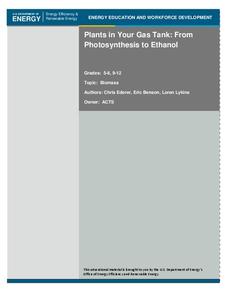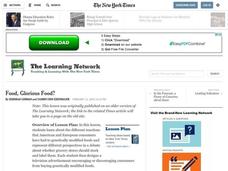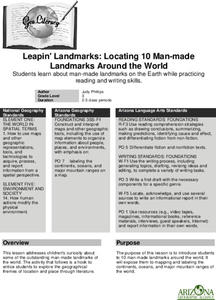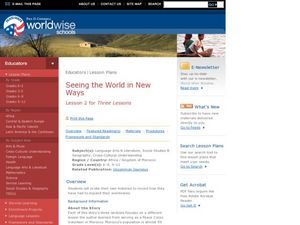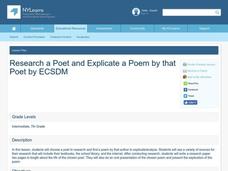Maryland Department of Education
The Concept of Identity Lesson 2: The Historical/Biographical Approach
"How does our environment shape our identity?" After researching biographical information about John Knowles and considering how these experiences are reflected in A Separate Peace, class members consider the strengths and weaknesses of...
Museum of Tolerance
Developing Media Literacy
To protect young people from questionable content, many schools limit access. This resource suggests that because learners can so readily avail themselves to unrestricted Internet access, it is vital for 21st century...
Center for History Education
How Did the Public View Women’s Contributions to the Revolutionary War Effort?
Calling upon the legacies of Joan of Arc, Elizabeth I, and Catherine the Great, Esther Reed rallied Southern women to support the American Revolution. Using a broadside by Reed and other primary sources, such as poetry, young historians...
Center for History Education
To What Extent Were Women's Contributions to World War II Industries Valued?
Women rose to the challenge when the nation's war effort called them—but were sent home when the GIs came back from World War II. Young historians consider whether the United States valued women's contributions during the war using a...
Curated OER
Plants in Your Gas Tank: From Photosynthesis to Ethanol
Explore ethanol and how it is produced. Young scientists investigate photosynthesis and fermentation to the concept of conservation of energy and mass. They discuss the environmental and economical benefits of ethanol as a fuel additive.
Prestwick House
Writing Arguments in Response to Nonfiction
Emotional appeal or argument? That is the question. An informative activity helps your class recognize the difference between a logical argument and an emotional appeal and learn how to craft an argumentative response. Writers develop a...
Curated OER
Food, Glorious Food?
How are the reactions between American and European consumers different when it comes to genetically modified foods? Use the New York Times article "Consumers in Europe Resist Gene-Altered Foods" to inform your middle schoolers...
Curated OER
The Scoop on Local Business
How do local businesses support their state or regional economy? The New York Times has prepared another great lesson for your class. They begin by listing products grown or manufactured in their state or region then write interview...
Curated OER
Identifying, Mapping, and Personifying Countries Involved in WWII
Get artsy with this WWII group activity, starting with a whole-class assignment. Create a map of Europe, Northern Africa, and the Pacific using geometric shapes cut from construction paper and placed on the floor. Consider splitting the...
Curated OER
Bird Ecology Unit
Birds, plants, and vegetation, is there anything more lovely? There is! Engage your class in the scientific process, data collection, and data analysis. They stroll their campus observing and identifying various birds and plants,...
Curated OER
Countries Involved in World War II
Students create their own floor map of Europe, Northern Africa, and the Pacific. They locate, identify, and speak for one of the countries involved. In addition, they classify the country they represent as an Axis Power or as an Allied...
Curated OER
Swamps, Shrimp, and Tsunamis: A Simulation of Sustainable Development Issues in Coastal Ecuador
Young scholars examine the economic benefits, environmental losses and dangers of the shrimp farming industry on the coast of Ecuador. They read a script, role-play people involved in the shrimp business, and write an essay of the pros...
Curated OER
Leapin' Landmarks: Locating 10 man-made landmarks around the world
Third graders engage in a lesson plan which addresses their curiosity about some of the outstanding people-made landmarks of the world. They explore the geographical themes of location and place through literature.
Curated OER
I Served in the American Civil War
Learners research soldier's lives in the American Civil War. They create a video about a soldier's life
Curated OER
Genetically Modified Organisms
High Schoolers complete a variety of activities as they examine the ethics of (and take a position concerning) genetically modified organisms in the field of agriculture. They complete a PowerPoint demonstration to go along with the unit.
Curated OER
Brief Encounter (Looking at Ourselves and Others)
Students participate in a simulation game in which they realize what it is like to be from another culture. They observe and describe different behaviors. They also examine values from other cultures.
Curated OER
Seeing the World in New Ways
Learners examine their own history to expand how they examine the world. They research being a Peace Corps volunteer in Morocco. They also examine Muslim culture.
Curated OER
Autism And The Brain
Help your class understand Autism. They conduct research into how the brain is effected by the disorder of autism. Then they write a letter to the Center For Disease Control about their findings and forward some of the new research to them.
Curated OER
Investigation of a Key Public Policy Issue
Twelfth graders select and analyze a public policy issue. In groups, they create a hot list of web sites that have been explored and investigated as a result of a web search. Using their research, 12th graders individually produce a...
Curated OER
Japanese Festivals and Holidays
Bring the excitement and beauty of Japanese festivals into your classroom. Kids with special needs create calendars that reflect special festivals and holidays common to Japanese culture. They start the project by creating a list of...
Foreign Policy Research Institute
Exploring Korea
A thorough and fun lesson on Korea! In groups of four (Social Chair, Historian, Translator, Travel Agent) class members research North and South Korea to determine a good location for an overseas institute for studying abroad. Once this...
Curated OER
Flying Freudian Fun: A Look At Ethical Decision Making
There are not many more apt examples of ethics gone awry than William Golding's Lord of the Flies.. Ninth graders focus the ethics of decision making with the examples provided in the plot. They focus on the...
Curated OER
Research a Poet and Explicate a Poem by that Poet
Using your school's media center, internet research, and a SMART board, 7th graders research a chosen poet and write a research report. Additionally, 7th graders explicate one poem by the poet within their report. Several resource links...
Middle Tennessee State University
Who's Afraid of the Big Bad Wolf? A Comparison in American Culture
As part of their study of the Progressive Era, class groups examine a 20th century version of "The Three Little Pigs" through a New Era lens and identify how ideals such as the value of hard work, creativity, and problem solving,...
Other popular searches
- Authors Viewpoint Reading
- Reading Author's Viewpoint
- Analyzing Author's Viewpoint
- Teaching Authors Perspective
- Author's Perspective Test
- Finding Author's Viewpoint
- Author's Perspective in Text
- Authors Viewpoint Passage
- Finding Authors Viewpoint
- Authors Perspective Map
- Analyzing Authors Viewpoint




